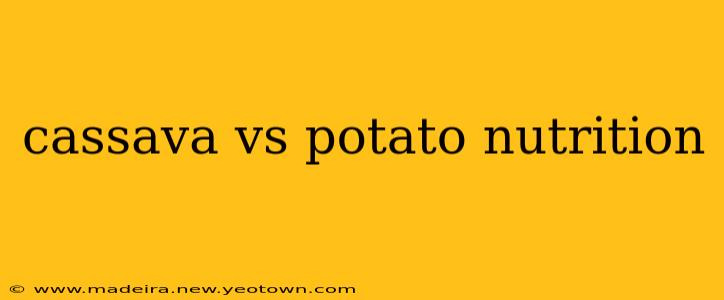The humble potato and the versatile cassava are both starchy staples across the globe, providing sustenance to billions. But which one reigns supreme in the nutritional arena? This isn't a simple "winner takes all" situation; both offer unique benefits, depending on your dietary needs. Let's delve into a delicious comparison, exploring their nutritional profiles and uncovering the subtle yet significant differences.
Our journey begins in the fields, where these two root vegetables flourish under varying conditions. Cassava, a tropical plant, thrives in warmer climates, while potatoes are more adaptable to temperate regions. This difference in environment subtly impacts their nutritional composition.
Cassava's Nutritional Profile: A Tropical Treat
Imagine a sunny afternoon in a tropical landscape. You're offered a plate of freshly cooked cassava. Its slightly sweet, nutty flavor hints at its unique nutritional makeup. Cassava is a significant source of carbohydrates, providing energy for daily activities. It's also a good source of dietary fiber, contributing to healthy digestion. While not as rich in vitamins and minerals as some other vegetables, cassava does offer modest amounts of vitamin C, potassium, and manganese.
However, a crucial note of caution: cassava contains cyanogenic glycosides. These compounds can release cyanide when ingested, particularly if the cassava is improperly processed. Proper preparation, including peeling, soaking, and cooking, significantly reduces this risk. But it’s a factor to keep in mind.
What are the benefits of eating cassava?
Cassava's benefits go beyond basic nutrition. Its high carbohydrate content makes it a valuable energy source, particularly in regions where it's a primary food crop. Its fiber content promotes healthy gut function, and its relative affordability makes it accessible to many.
Is cassava good for weight loss?
Cassava's high carbohydrate content means it shouldn't be a cornerstone of a weight loss diet. While the fiber can contribute to satiety, the overall caloric density needs to be considered within a balanced weight management plan.
Potato Power: A Temperate Titan
Now, let's shift our scene to a cooler climate, where potatoes thrive in the rich soil. Potatoes are undeniably a nutritional powerhouse compared to cassava, offering a more diverse array of vitamins and minerals. They are excellent sources of potassium, vitamin C, and vitamin B6. Potatoes also contain antioxidants and fiber, contributing to overall health. The nutritional content can vary slightly depending on the potato variety and how it’s prepared. Leaving the skin on significantly boosts the fiber and nutrient content.
What are the health benefits of potatoes?
The health benefits of potatoes are extensive. Their potassium content supports healthy blood pressure, vitamin C acts as an antioxidant, and the fiber aids digestion. Furthermore, potatoes are a good source of complex carbohydrates, providing sustained energy release.
Are potatoes good for weight loss?
Similar to cassava, the high carbohydrate content of potatoes needs careful consideration within a weight loss plan. However, potatoes, when prepared without excessive added fats or oils, can be part of a balanced diet for weight management. Their filling nature can contribute to satiety, which is beneficial in weight loss.
Cassava vs. Potato: The Nutritional Face-Off
| Feature | Cassava | Potato |
|---|---|---|
| Carbohydrates | High | High |
| Fiber | Moderate | Moderate |
| Protein | Low | Low |
| Fat | Very Low | Very Low |
| Vitamin C | Moderate | High |
| Potassium | Moderate | High |
| Vitamin B6 | Low | Moderate |
| Cyanogenic Glycosides | Present (requires proper processing) | Absent |
Conclusion: Choosing Your Champion
The "better" choice between cassava and potato ultimately depends on your individual dietary needs and preferences. Cassava provides readily available carbohydrates and is a crucial food source in many parts of the world, but its preparation requires care. Potatoes offer a broader range of vitamins and minerals, making them a more nutrient-dense option. Both can be part of a healthy diet, offering valuable energy and nutrients, but mindful consumption and preparation are key.

